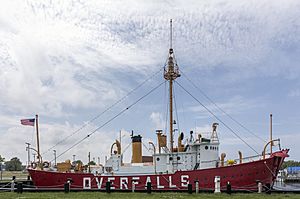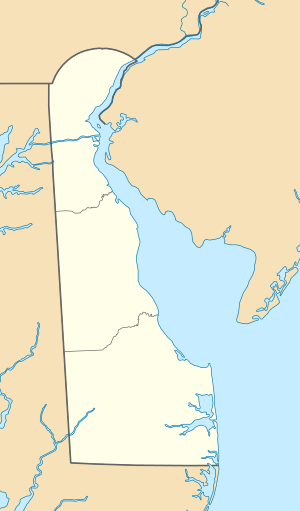United States lightship Overfalls (LV-118) facts for kids

WAL 539 painted for "OVERFALLS" station, docked in Lewes, Delaware in 2015
|
|
Quick facts for kids History |
|
|---|---|
| Name | LV 118 |
| Operator | United States Lighthouse Service/United States Coast Guard |
| Builder | Rice Brothers Corporation, East Boothbay, Maine |
| Cost | $223,900 |
| Launched | 4 June 1938 |
| Commissioned | 11 September 1938 |
| Decommissioned | 7 November 1972 |
| Renamed |
|
| Status | Museum Ship in Lewes, Delaware |
| General characteristics | |
| Type | Lightvessel |
| Displacement | 412 short tons (374 t) |
| Length | 114 ft 9 in (34.98 m) |
| Beam | 26 ft (7.9 m) |
| Draft | 13 ft 4 in (4.06 m) |
| Installed power | Cooper-Bessemer 8 cylinder air-start Diesel engine, 400 bhp (300 kW) |
| Propulsion | Single shaft, reduction gear, 7 ft 2 in (2.18 m) propeller |
| Speed | 9 knots (17 km/h; 10 mph) |
| Crew | 14 |
|
Lightship WAL-539
|
|
| Location | Lewes, Delaware |
| Built | 1938 |
| Architect | Rice Brothers |
| NRHP reference No. | 89000006 |
| Significant dates | |
| Added to NRHP | 16 February 1989 |
| Designated NHL | 14 June 2011 |
The Lightship Overfalls (also known as LV-118 and WAL-539) is a special kind of ship. It was the very last lightvessel built for the United States Lighthouse Service. This service later became part of the United States Coast Guard. Today, the Overfalls is a museum ship. You can visit it in Lewes, Delaware.
Contents
The Lightship Overfalls
What is a Lightship?
Imagine a lighthouse, but instead of being on land, it floats on the water! That's what a lightship is. These ships were like floating lighthouses. They had bright lights and loud fog signals. Their job was to warn other ships about dangerous areas. They also helped guide ships safely into harbors. Lightships were very important before modern navigation tools existed.
Building a Special Ship
The Overfalls was built in 1938. It was made to replace another lightship that was badly damaged. This happened during a huge storm called the New England Hurricane of 1938. The Overfalls was built by Rice Brothers Corporation in Maine. It cost about $223,900 to build. This ship was unique because its hull (the main body of the ship) was different from other lightships. It was also the last lightship built with a "riveted hull." This means its metal plates were joined together with rivets, like big metal buttons. Later ships used welding instead.
The Overfalls had a powerful diesel engine. This engine helped it move and also powered its lights and other equipment. Its main light was very bright. It was placed on a single mast, about 57 feet above the water. For foggy weather, it had two loud foghorns called "diaphones." It also had a bell and a radio beacon. In 1943, a radar unit was added. This helped the crew see other ships and obstacles in bad weather. The ship had a crew of 14 people. They worked for two weeks and then had one week off.
Life at Sea: Stations and Service
When the Lighthouse Service joined the Coast Guard in 1939, the ship's name changed. It went from LV 118 to WAL 539. The Overfalls served at several important locations:
- 1938-1957: Cornfield Point, Connecticut
- 1958-1962: Cross Rip, Massachusetts
- 1962-1972: Boston, Massachusetts
Unlike many other US lightships, WAL 539 stayed at its station during World War II. This shows how important its job was.
From Service to Museum
In December 1970, a severe storm damaged the ship. Because of this damage, the Overfalls was taken out of service on November 7, 1972. After its retirement, the ship was given to the Lewes Historical Society. It was then put on display in Lewes, Delaware.
When it became a museum, the ship was painted with the name "OVERFALLS." This was the name of a different lightship station. The Overfalls (WAL 539) never actually served at the "Overfalls" station. The real lightship that served there is now in Portsmouth, Virginia.
Over time, the Overfalls started to show its age. In 1999, a group called the Overfalls Maritime Museum Foundation was formed. This group took over the care of the ship. They worked hard to restore it and keep it in good condition. Today, the Overfalls is still in Lewes. You can take tours and learn all about its history.
The Overfalls is a very important ship. It was added to the National Register of Historic Places in 1989. In 2011, it was given an even higher honor. It was named a National Historic Landmark. This means it is a place of great historical importance to the United States.
See also


